Seven powerful plant antioxidants can dramatically extend your perfume's life: tea tree, eucalyptus, lavender, frankincense, rose extract, and citrus oils like orange and lemon. Tea tree leads the pack with up to 86.9% radical-scavenging activity, while orange seed oils offer 70% protection. You'll get the best results by combining these natural preservatives with proper storage in dark glass bottles at cool temperatures. Discover how these botanical guardians can transform your fragrance collection's longevity.
Essential Oils: Nature's Secret Fragrance Guardians
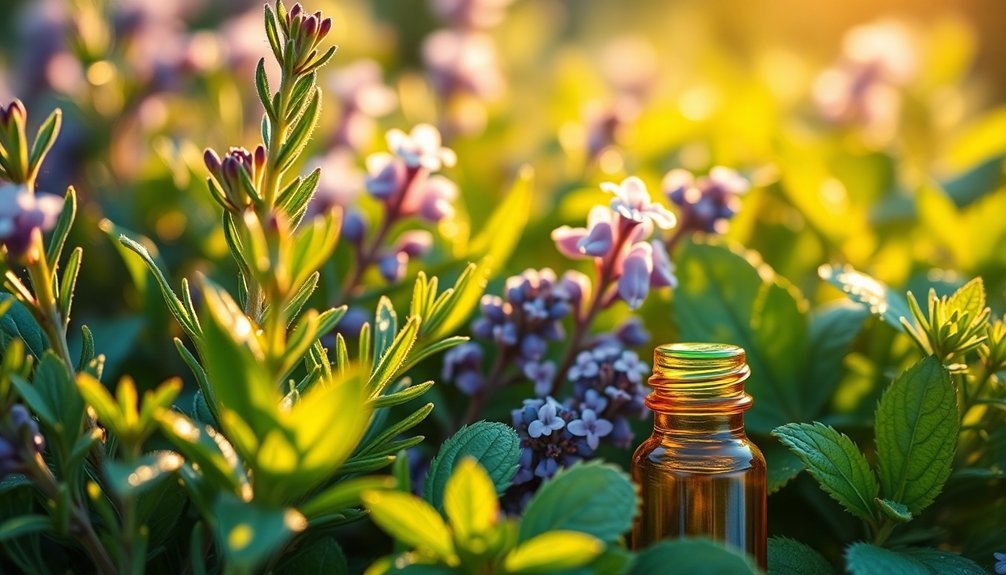
While many people think of essential oils primarily as fragrances, these concentrated plant extracts serve as nature's powerful antioxidant guardians in perfumery.
You'll find remarkable antioxidant properties in Australian native oils like lemon-scented tea-tree and blue cypress, which can neutralize harmful free radicals with up to 86.9% effectiveness.
Essential oils from cinnamon, neroli, and lavender contain potent compounds like cinnamaldehyde, limonene, and linalool that protect your perfume's integrity. The proven antioxidant and antibacterial properties of these essential oils make them excellent natural preservatives for perfumes.
These natural preservatives fight oxidative stress, helping maintain your fragrance's intended scent profile.
To maximize their protective benefits, you'll need to store your essential oil-enhanced perfumes in dark glass bottles at cool temperatures, ideally between 2-5°C.
This careful storage prevents degradation and guarantees your fragrances stay fresh and true to their original composition.
The Power of Tea Tree and Eucalyptus Antioxidants
You'll find remarkable antioxidant defense systems in tea tree and eucalyptus oils, with tea tree showing up to 86.9% radical-scavenging activity and eucalyptus contributing substantial phenolic compounds.
When you combine these powerhouse oils, their synergistic effects create an even stronger shield against oxidative damage in perfume formulations.
The natural preservation capabilities of these essential oils make them invaluable for extending your fragrance's longevity while providing additional skin health benefits. The perfume's organic grain alcohol base further enhances the stability and purity of these botanical compounds.
Essential Oil Defense Systems
Tea tree and eucalyptus oils stand as nature's powerful antioxidant defenders in the world of perfumery.
You'll find their defense mechanisms work through multiple pathways: tea tree oil reduces inflammatory cytokines while boosting glutathione levels, and eucalyptus oil exhibits impressive DPPH radical scavenging activity at concentrations as low as 90 ppm.
When you're looking to protect your perfume formulations, these oils' natural defense systems offer a dual advantage.
Tea tree's nanoemulsions penetrate deeply into the skin, while eucalyptus oil's bioactive compounds fight against oxidative degradation.
Together, they create a robust shield that helps maintain your fragrance's integrity. These oils are particularly effective as base notes in formulations, providing lasting protection throughout the fragrance lifecycle.
You'll benefit from their complementary actions – tea tree's anti-inflammatory properties work alongside eucalyptus's potent antibacterial effects to preserve both the scent and its beneficial properties.
Natural Longevity Boosters
When exploring natural ways to extend perfume longevity, the antioxidant power of tea tree and eucalyptus oils stands out as a remarkable solution. You'll find these oils effectively prevent oxidation and degradation of other fragrance ingredients, helping your perfume maintain its intended scent for longer periods.
What makes these oils particularly effective is their ability to penetrate deeply into the skin's stratum corneum layers while maintaining their antioxidant properties. You won't just benefit from longer-lasting fragrances – these oils also protect your skin from free radical damage.
When combined with other antioxidants like vitamin C, they create a synergistic effect that enhances overall stability and protection. For best results, look for clean, toxin-free formulations that harness the natural preservative power of these sustainable plant extracts.
Rose Extract: A Classic Perfume Preserver
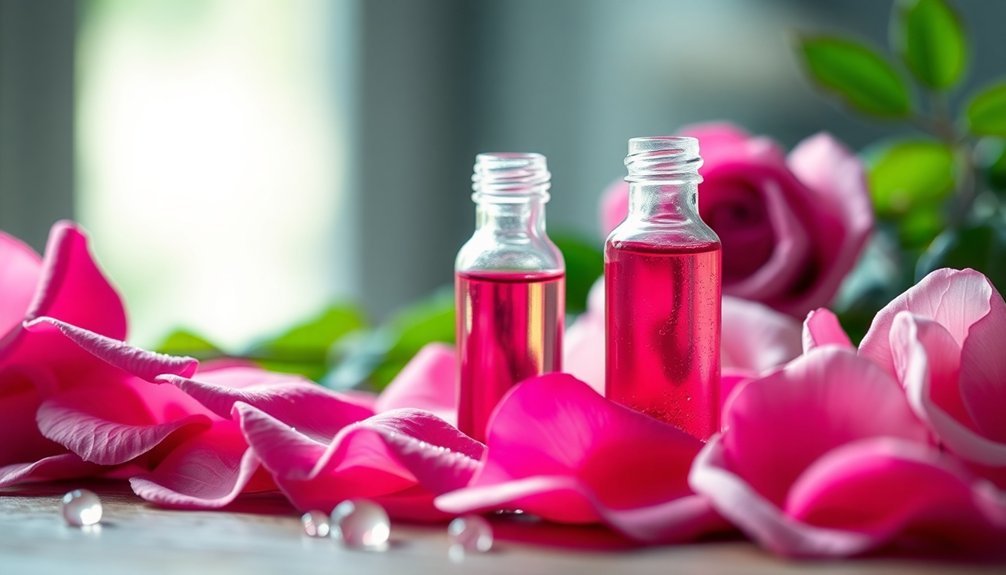
You'll find remarkable antioxidant compounds in rose extract, including flavonoids, phenols, and tannins that actively fight free radicals.
When you use perfumes containing rose extract, you're getting natural preservation benefits thanks to its high DPPH trapping activity that increases with concentration.
Your skin receives anti-aging and anti-inflammatory advantages from these potent plant compounds, making rose extract both a fragrance enhancer and a protective ingredient in perfumery.
Powerful Antioxidant Properties
Rose extract stands as one of nature's most potent antioxidant sources in perfumery, thanks to its rich composition of polyphenols, flavonoids, and volatile compounds.
When you're seeking natural preservation for your fragrances, you'll find that rose extract's impressive antioxidant activity directly fights free radicals through multiple pathways.
- High concentrations of bioflavonoids work synergistically with Vitamin C, protecting it from oxidation.
- Combined polyphenols and tannins deliver potent free radical scavenging abilities, with DPPH rates reaching 26.13%.
- Essential compounds like β-phenylethanol, citronellol, and geraniol contribute to both preservation and fragrance.
You'll appreciate how rose extract's cellular protection mechanisms don't just preserve your perfume – they also offer skin-nurturing benefits, making it a dual-purpose ingredient in modern fragrance formulations.
Beauty Benefits When Applied
Beyond its role as a perfume preserver, natural rose extract delivers remarkable beauty benefits to your skin during wear. When you apply fragrances containing rose water, you'll benefit from its natural anti-inflammatory and antibacterial properties while maintaining your skin's ideal pH balance of 4.1-5.8.
You'll notice how it helps minimize irritation and keeps your skin feeling comfortable throughout the day. The extract works as a gentle astringent, tightening your pores and controlling excess oil that could lead to breakouts.
It's packed with antioxidants and vitamins that protect and nourish your skin. You'll especially appreciate how rose water's mild, natural scent complements your perfume while providing these skincare advantages, making it a perfect addition to your daily beauty routine.
Lavender's Dual Role in Scent Stability
While lavender's fragrant properties make it a popular choice in perfumery, its exceptional stability and antioxidant characteristics serve a dual purpose in scent preservation.
Studies of vintage lavender oil from 1945 demonstrate remarkable stability, with minimal oxidation when properly stored. This natural antioxidant power doesn't just preserve the oil itself – it helps protect other fragrance ingredients too.
- Lavender oil's high content of linalool (40.8%) and linalyl acetate (16.4%) provides a stable base for perfume formulations
- Its antioxidant properties help combat oxidative stress that can degrade fragrances over time
- Modern nanoemulsion technology enhances lavender's stability and delivery, extending fragrance life
You'll get the best results by storing your lavender-based perfumes in amber glass containers and keeping them refrigerated to prevent oxidation and maintain scent integrity.
Frankincense: Ancient Wisdom for Modern Fragrances
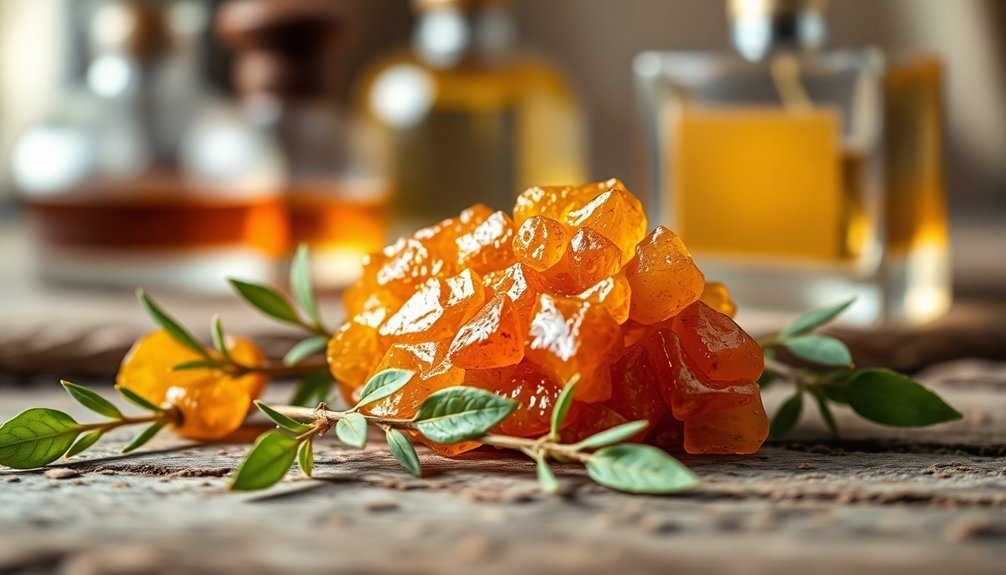
Known for its sacred history in religious ceremonies, frankincense brings powerful antioxidant properties to modern perfumery through its complex blend of terpenes and boswellic acids.
You'll find key compounds like limonene, pinene, and borneol working together to protect your fragrance from oxidation while adding their signature woody, earthy notes.
What makes frankincense particularly valuable in perfumery is its dual role: it's both a fixative and an active ingredient.
The oil's mono- and diterpenes help stabilize other fragrance components while its antioxidant properties combat the degradation that often plagues natural perfumes.
When you're formulating with frankincense, you're not just adding a timeless aroma – you're incorporating a natural preservative that shields your blend from environmental stressors and extends its shelf life.
Citrus Oils: Zesty Antioxidant Protection
Like frankincense, citrus oils offer powerful natural protection for your fragrances, but with a bright, energetic twist. These zesty oils pack impressive antioxidant power, with orange seed oils showing up to 70% free radical scavenging activity.
They're particularly rich in α-tocopherol, which directly correlates with their protective abilities.
- Pera-rio orange seed oil leads the pack with the highest antiradical efficiency (2.79) and phenolic content (4.91 g/kg)
- You'll find abundant phytosterols (1304.2 mg/kg) and carotenoids (19.01 mg/kg) that help prevent oxidation
- These oils outperform synthetic preservatives like BHT in protecting against thermal degradation
When you're formulating perfumes, citrus oils don't just add vibrant, fresh notes – they're working hard behind the scenes to keep your fragrances stable and long-lasting.
Plant-Based Perfume Storage Solutions
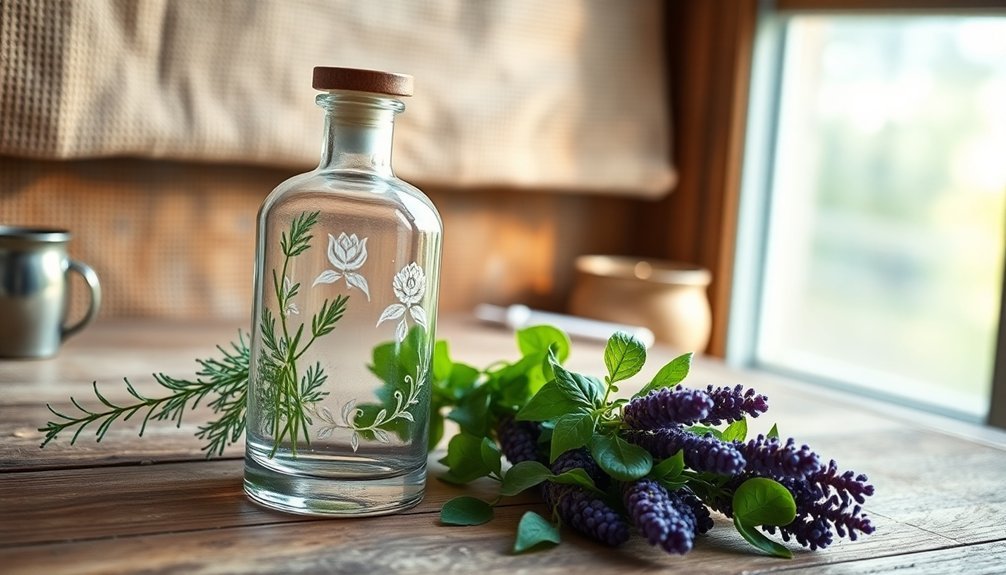
To preserve the delicate plant compounds in your natural perfumes, proper storage makes all the difference.
Keep your fragrances in a cool, dark place between 15-20°C, away from direct sunlight and heat sources. Your bedroom closet or dresser drawer provides an ideal environment for maintaining fragrance integrity.
Don't store your perfumes in the bathroom, as humidity can break down the plant compounds and accelerate ingredient evaporation.
Instead, choose a dedicated storage space like a cabinet or dark box that protects against UV damage. You'll want to keep the bottles tightly closed after each use and avoid excessive shaking, which can disrupt chemical bonds.
If you're serious about extending your perfume's life, consider refrigeration – it'll greatly slow down the aging process of those precious plant extracts.
Frequently Asked Questions
Can Plant-Based Perfumes Trigger Seasonal Allergies?
Yes, you can experience seasonal allergies from plant-based perfumes if you're sensitive to specific botanical ingredients. Natural compounds like limonene and linalool, commonly found in essential oils, may trigger allergic reactions.
How Do Antioxidant Properties Change When Mixing Different Essential Oils?
When you mix essential oils, you'll often see enhanced antioxidant effects. For example, combining T. fontanesii, A. herba-alba, and R. officinalis creates stronger antioxidant properties than using them individually.
What's the Average Shelf Life of Plant-Based Perfumes Versus Synthetic Ones?
You'll find plant-based perfumes typically last 1-3 years, while synthetic ones can stay fresh for 2-5 years. Though synthetics generally last longer, proper storage and high-quality formulation can extend both types' longevity.
Do Natural Perfumes React Differently on Oily Versus Dry Skin?
Yes, your natural perfumes will fade faster on dry skin due to lack of oils to trap scents. On oily skin, they'll last longer and smell stronger because natural oils help capture and hold fragrance molecules.
Can Temperature Fluctuations Affect the Antioxidant Potency in Plant-Based Perfumes?
Yes, temperature changes can affect your plant-based perfume's antioxidant strength. When you expose them to heat above their stability thresholds, you'll lose potency – most natural antioxidants start degrading between 85-300°C.
In Summary
You've now discovered how nature's own antioxidants can extend your perfume's life naturally. By incorporating these seven plant-based preservatives into your fragrances, you'll notice enhanced stability and longevity. Whether you choose tea tree's potent properties or rose's timeless protection, these botanical solutions offer a clean, effective way to keep your scents fresh. Start experimenting with these natural preservatives to transform your perfume's staying power.
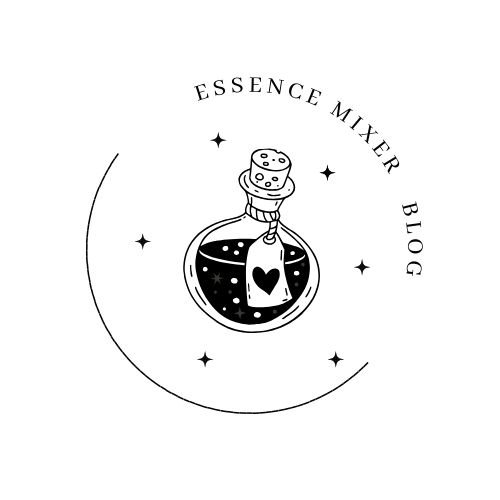
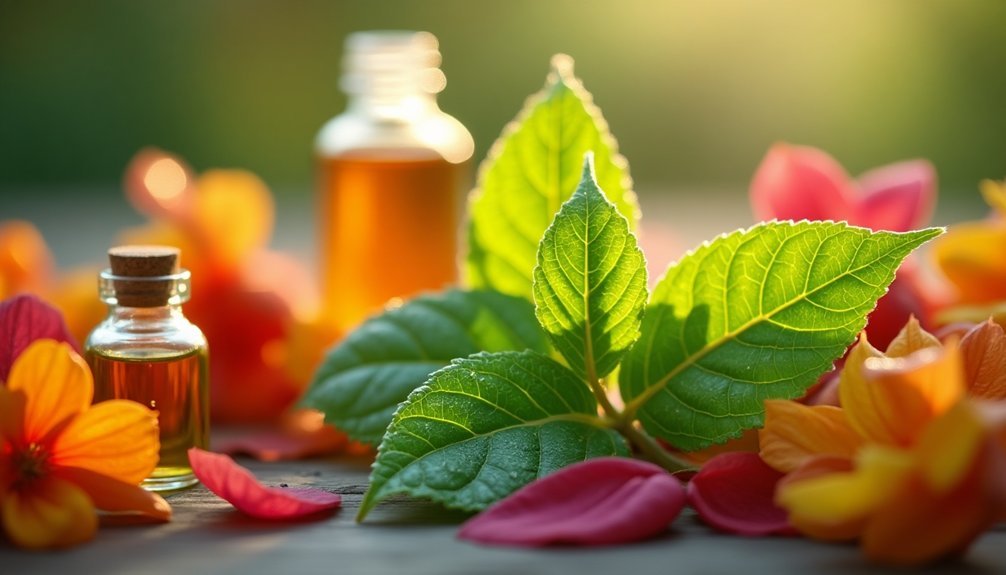



Leave a Reply